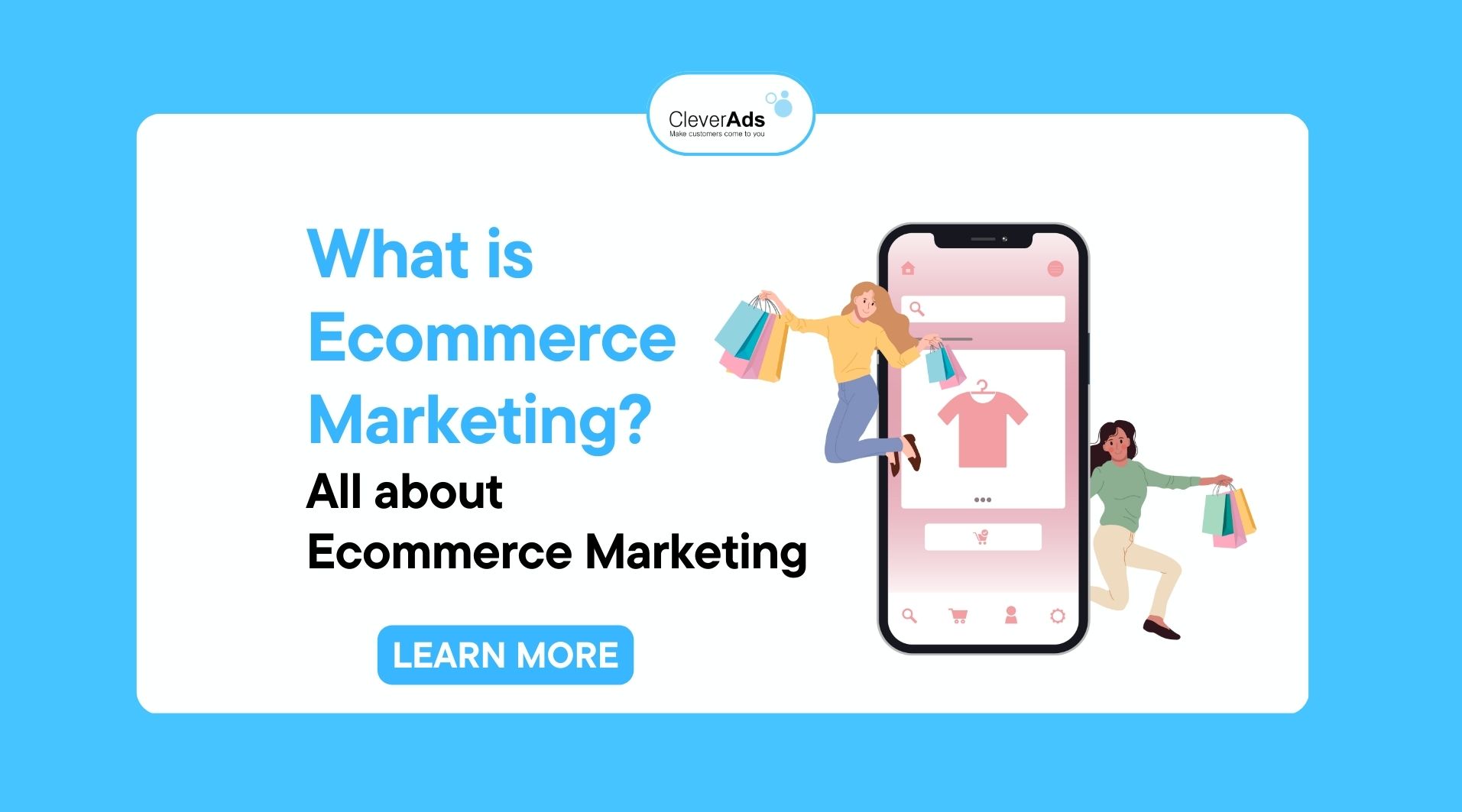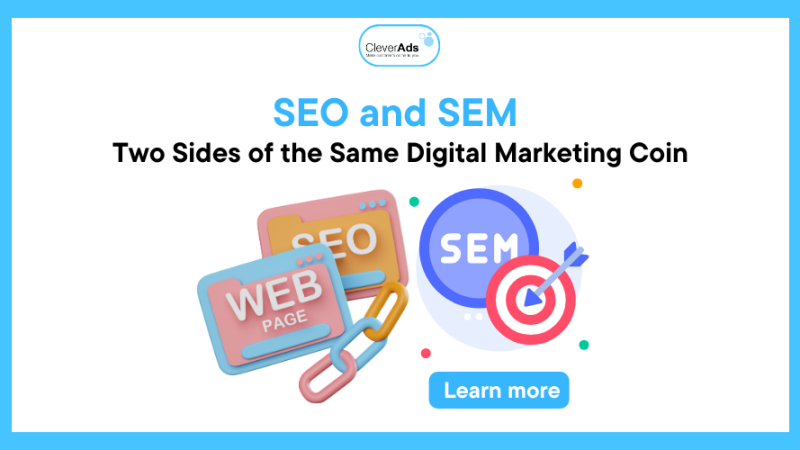What is Ecommerce Marketing? All about Ecommerce Marketing

With almost all marketing now happening online, it can be difficult to distinguish between the types of digital marketing businesses use today. For example, what is Ecommerce marketing, and how does it compare to marketing activities like Social Marketing, Content Marketing, SEO, or Email Marketing?
1. What is Ecommerce Marketing?
Ecommerce marketing uses social networks, digital content, search engines, and email campaigns to drive traffic to an online store, conversions, and increase sales. Those visitors into leads and retain them after making a purchase.
A comprehensive Ecommerce Marketing strategy comprises marketing strategies on and off your website. Proper marketing strategies can help you build brand awareness, drive customer loyalty, and increase online sales.
2. Popular Ecommerce Marketing Channels
To give you a deeper understanding of Ecommerce Marketing, CleverAds will list 5 popular Ecommerce Marketing channels and how to use them to build an online store. In addition, the popular tools to optimize these marketing channels will also be revealed below.
2.1. Search Engine Optimization (SEO)
SEM is considered an effective Ecommerce Marketing channel when it includes search engine optimization (SEO) and paid advertising. At the same time, SEO relies on your knowledge of Google’s ranking algorithm to optimize content. At the same time, SEM can be related to pay-per-click (PPC) campaigns, display campaigns, or product-specific advertising campaigns (e.g., Google Shopping), which allows you to pay for placements. Top positions on search engine result pages.
This is why ecommerce marketers often sign up with Google AdWords and promote their product pages through PPC campaigns.
This campaign allows your product to appear directly in front of Internet users’ screens every time they click on a paid ad, increasing the likelihood that Google users will purchase before leaving your sales site.
- Other top SEO tools
- Google PageSpeed Insights
- Google Keyword Planner
- Ubersuggest
2.2. Content Marketing
Content Marketing is one of the 5 popular forms of Ecommerce Marketing. When you hear this phrase, you will often think of blogging and video production – content that aims to improve your site’s rankings in search engines and answer questions related to your website. Your industry. But if your business sells products online, is it enough to write blog posts and produce videos to drive sales from customers? Content Marketing is more than that.
Here are a few ways to use the content for marketing your ecommerce store.
- Product page optimization: include headlines, product descriptions, high-resolution images, and intro videos. Ensure that these sections contain the right keywords geared toward your product.
- Post relevant blog posts: Create content around your niche that provides valuable information to your customers. For example, if you manage an online wedding dress shop, you need to write blog posts about “how to plan a wedding”. This content can get everyone involved in wedding preparations no matter where they are in the planning process.
- Leverage various media: Try out videos, podcasts, or other interactive media to create content and find customers—for example, video production on youtube – the most popular video social networking platform today. Therefore, if your business wants to reach many customers, YouTube is the ideal place.
Top Content Marketing Support Tools
- Feedly
- Buzzsumo
- Google Trends
- Grammarly
- Uberflip
2.3. Social Media Marketing
E-commerce is one of the industries that benefit greatly from social media. Most brands, publishers, contractors, or any business have a personal page on today’s popular social networks to connect with their customers and post content to attract viewers. Therefore, Social Media Marketing is also considered one of the popular Ecommerce Marketing channels.
Ecommerce websites are highly invested in terms of images.
As a result, your success on social media depends on your use of images to drive attention and traffic to your product pages.
Additionally, posting social media articles and creating shoppable content, which allows visitors to buy instantly, will facilitate future Ecommerce Marketing efforts. When the increase of Ecommerce platforms such as Instagram Shopping and Tiktok Shop.
Top tools to support Social Media Marketing
- HootSuite
- Sprout Social
- AdEspresso
- Buffer
2.4. Email Marketing
You can dramatically increase your customer conversion rate using email marketing wisely. No matter how many ‘Email is dead’ articles appear occasionally, Email Marketing has retained its prominence in terms of its value in Ecommerce Marketing.
Through effective email marketing tactics, businesses can increase the number of customers buying their products.
For example, it is possible to increase website visitors who sign up for your email list with downloadable assets or by strategically placing lead generation tools (title bars, pop-ups, etc.)
After they subscribe to your mailing list or provide their email address during checkout, you can start the appropriate email sequence. For example welcome email (for newly registered customers), discount email, email update their purchase information (including order confirmation, receipt/invoice, shipment, delivery confirmation) and return/exchange email), etc.
Top email marketing tools
- Mailchimp
- ConvertKit
- ActiveCampaign
- GetResponse
2.5. Influencer Marketing
People are influenced by the people they trust. Users would charge a celebrity or an expert in their niche instead of a brand. That’s why Influencer Marketing is such an effective form of Ecommerce Marketing.
Influencers build communities of people who know, like and trust them. As a result, it’s easy for them to get people’s attention around your product through a recommendation or “sponsored post.”
Top influencer marketing tools
- Followerwonk
- Kred
- HypeAuditor
3. Tips to build an effective Ecommerce Marketing strategy
After understanding the concept and types of Ecommerce Marketing, let’s look at some tips to build a successful Ecommerce Marketing plan for your online store.
3.1. Set goals based on industry standards.
Depending on your industry, location, business size, and countless other factors, there are several standards you can use to measure your goals – those are Benchmarks. This is the first step to building a successful Ecommerce Marketing plan.
In addition, your business needs to consider goals such as website visits, click-through rates, conversion rates, and customer conversion costs. Also, it’s important to compare those goals with other businesses in your niche.
3.2. Break down your Ecommerce Marketing strategy into small tactics.
When building your Ecommerce Marketing plan for your online store, CleverAds recommends first focusing on a few key strategies that you believe will have the highest ROI (Return on Return) – and the most accessible. For you – and create action items for each strategy.
For example, you decide to focus on a paid strategy to attract users to your store. You need to break this strategy down into what you will do:
- Set up your Google Ads account.
- Determine your advertising costs.
- Create ad groups based on your target keywords.
- Monitor your account daily.
3.3. Satisfy new and long-time customers.
Marketing, in general, doesn’t stop after a sale. Therefore, so is Ecommerce Marketing. Once someone becomes your customer, you should continue to attract, nurture, and delight them.
This way, you will create customer loyalty. It will also make your customers want to share their positive experiences with other prospects and your target customers through cause-and-effect studies, reviews, testimonials, and word of mouth. This can contribute to the sustainable success of the business.
4. Conclude
Through the above article, CleverAds helps you better understand the concept of Ecommerce Marketing and the popular Ecommerce Marketing channels businesses use. As you can see, Ecommerce marketing is a powerful tool that can be leveraged to promote any online wholesale or retail business and commercial transaction organizations.
If your business requires Digital Marketing solutions, contact us at cleverads.com.ph. for the fastest support.



